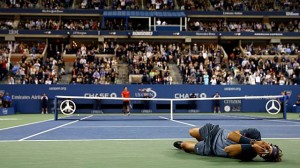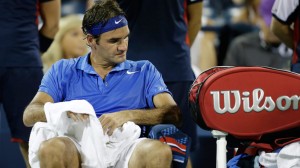NEWS FLASH! Rafael Nadal, a short-ish lefthander from Spain, of all places, just won the United States Open tennis championship! It was a stunning, unforeseen victory that left him flat on his back, overwhelmed by exhausted emotion, utterly shocked by this incredible result in one of tennis’s greatest venues, and one of its most important tournaments of the year.
Well, no. Not really. Although he did lie prone on the court, absorbing the admiring roars of 22,000 at the Arthur Ashe court, attracting millions of viewers and hundreds of millions of GIFs and dramatic stills, it was hardly a shock. Nadal is the king of contemporary tennis. This was his 13th major championship, and a 2ndvictory in New York. Pardon me for probing the sincerity of his reaction – from all I’ve read and seen, Rafa is an astonishingly fierce competitor on court, a dedicated trainer and a fine gentleman off it – but haven’t these amazed post-match collapses become a little clichéd?

This was Grantland.com’s photo of Nadal in victorious distress. Way in the background, Djokovic waits to be acknowledged.
While his opponent, Novak Djokovic, did have a stretch of domination over Nadal, the Spaniard has won six of their last seven matches. Yes, the Open meant a lot to him after a couple of injury-hampered seasons, but it’s not like he was a long-shot. What’s going on?
I chanced on an excellent documentary about Arthur Ashe and the little-known sacrifice made for him by his older brother Johnnie. Ashe, of course, was the great Black American playerwho broke through and won the U.S. Open in 1968, an explosive year in American history. Imagine: his brother was in Vietnam, doing a second tour of duty in that bitter war so that his kid brother Arthur wouldn’t have to; Martin Luther King had been killed months earlier, and American cities were boiling with African-American frustration, or aflame with rioting; no Black man had ever won a major tennis championship. No pressure there! (And still, no other male player of African descent has ever won the Australian or U.S. Opens, or at Wimbledon. Few athletes of any tribe have been as thoughtful and as committed to social justice as he was.) In the doc, we
see Ashe win the ’68 title match and immediately glide to the net to shake hands with his opponent, Tom Okker. His emotions must have been turbulent, yet his demeanour was controlled and gracious.
I know: it was a different time. There weren’t the monetary incentives, the marketing imperatives or the furious training pressures faced by today’s players. Still, I was struck by the image of a sprawled Nadal, and how required, how scripted all this seems now: there is an international corporate brand to be built, and this emotionally charged, photographer-friendly pose appears to be a necessary element. Years ago, one writer (whose name I can’t recall) called this “kitsch”, more academically defining it as a “second-order emotion” – not an unplanned expression of “oh my God, this is incredible!” but more of a self-involved “look, have you noticed how amazing it is to be me?” Many athletes (and most of us, apparently!) want to be seen these days as having lived dramatic and public emotional moments. I don’t accuse Rafael Nadal of crass salesmanship or blatant insincerity, but it sure looks like this is where the bar has been set for victory celebrations in pro tennis. When he and Djokovic stop winning these things, someone else will have the subtle pressure not only to defeat them on the court, but also to one-up their very open displays of incredulity.
This brings me to Roger Federer. NEWSFLASH THE SECOND: The King is dead! Quick, retire the King! Abdicate, Fed, abdicate now!! He didn’t even make the quarter-finals of this tourney, the first time that’s happened since he was a pup. The Swiss star, lest we forget, is number one on the list of major championship winners (17), and for years it was him volleying with Nadal for supremacy. Now, though, he’s an ancient warrior of – wait for it –

An unhappy day for the athlete, but Nike, Wilson, Federer Inc. and many others are still commercial champions.
thirty-two. My mother-in-law, a woman of discriminating tastes and scant interest in sweaty sportsmen, is nevertheless a big fan of Federer, so the last couple of years have brought some disappointing moments to her little TV. She loves his ease of movement and creative flair; while she also admires Nadal, his grunting, muscular fury is not so much to her liking. Federer, too, has been known to swoon in disbelief after winning yet another anticipated victory, but he’s slowing down. He’s “only” won two majors in the last four years. He is no longer a lock to be a Big Tent semifinalist, as he was for nearly a decade. So why is he still playing? We don’t want to remember him this way!
My only live sight of the magnificent Willie Mays was of him stumbling around in 1970s outfields. I wish I’d seen Oscar Robertson in his prime, not just as a steady hardcourt accompanist to the young Kareem Abdul-Jabbar. Since then, I’ve been partial to having the greats retire not too far past their peaks. We tend not to think of it from the athlete’s point of view, but only from ours. Why does Federer continue? Maybe he’s kidding himself. Maybe he thinks he can still be Number One. On the other hand, maybe we should consider that he still loves to play, that perhaps now he has an intriguingly different challenge than when he was dominant. Not that he hasn’t made enough money for several lifetimes, but how many of us would refuse the chance to make millions for playing our favourite sport, to say nothing of the cheers, that palpable love and appreciation? But he’s tarnishing his LEGACY, we complain. In the third of his four articles on the US Open, the superb Brian Phillips takes a moment to absolutely trash the “legacy” argument.
Phillips dismisses it mainly as an over-hyped concept developed to sell shoes and fill the endless hours of sports blab in the media. He also argues that a genuine athletic “legacy”, if such a thing matters, is important only once a career is well and truly over, and that the sporting public has enough brain power to recall seventeen major titles even if the wins were less frequent towards the end. There’s something else, though. The legacy debate is usually about what I think and want with regard to an athlete whom I know only as a televisual virtuoso, and not as a person at all. It’s another bit of kitsch, a second-order emotion which wants others to give attention to how I feel about Professor Fed. It cares nothing about what my beloved Roger wants and experiences.
Fan-dom is a funny thing. This sports lover is trying to learn to think of himself a little less, and to see sport a little more nearly as the men in the arena experience it. And when they win with dignity, and in the best gentlemanly tradition rush to the net to recognize a fallen foe – or respectfully seek out the vanquished but noble challenger Tim Duncan, as LeBron James* did after the NBA Finals’ game 7 last June – I can’t help but salute such a small dent in our sporting culture’s armour of self-absorption.
* By the way, no athlete, at least in North America, suffers under the tyranny of this incessant “legacy” talk as LeBron James. What will it be like when he loses a step, when he’s not the fastest and strongest on the court anymore? Man, you’d better retire NOW and beat the rush.
This article clarifies, after a good catch by a reader, that Ashe is the only Black male to win at three of the Big 4 tourneys. France’s Yannick Noah (Joakim’s Dad) won the French Open in 1983, and of course the American Williams sisters have dominated tennis in the 2000s. Serena matches Federer now after her recent fifth U.S. Open. She has 17 majors, though she still looks up on the list to Martina, Chris, Helen, Steffi, and Margaret.


Ashe and Okker showed great composure and sporting behaviour after this match. They stayed together and could be seen in different parts of Flushing Meadows smiling and chatting. No rushing off to press conferences by Ashe and no quick exit by Okker to get over his disappointment . Real sportsmen.